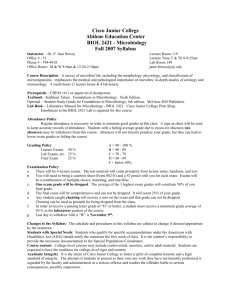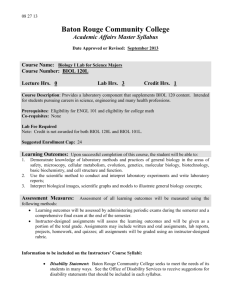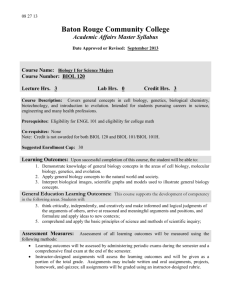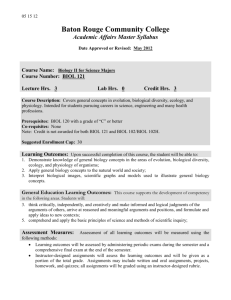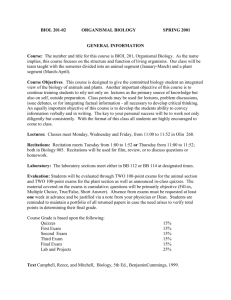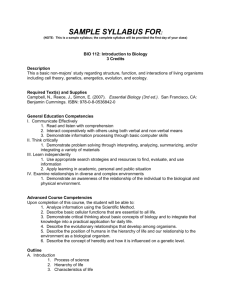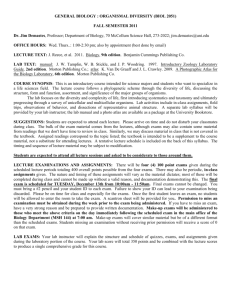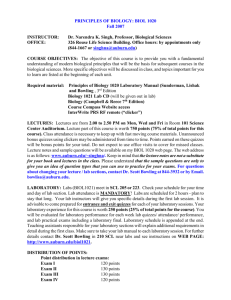BIOL 1411 - General Biology I - Botany - Syllabus
advertisement
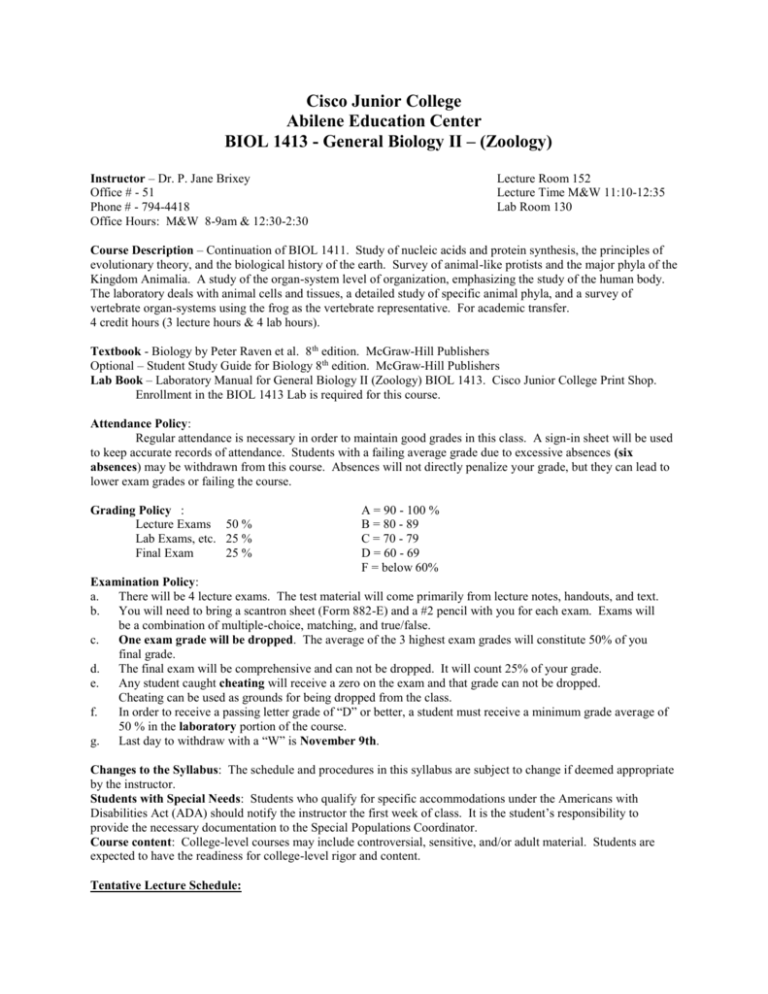
Cisco Junior College Abilene Education Center BIOL 1413 - General Biology II – (Zoology) Instructor – Dr. P. Jane Brixey Office # - 51 Phone # - 794-4418 Office Hours: M&W 8-9am & 12:30-2:30 Lecture Room 152 Lecture Time M&W 11:10-12:35 Lab Room 130 Course Description – Continuation of BIOL 1411. Study of nucleic acids and protein synthesis, the principles of evolutionary theory, and the biological history of the earth. Survey of animal-like protists and the major phyla of the Kingdom Animalia. A study of the organ-system level of organization, emphasizing the study of the human body. The laboratory deals with animal cells and tissues, a detailed study of specific animal phyla, and a survey of vertebrate organ-systems using the frog as the vertebrate representative. For academic transfer. 4 credit hours (3 lecture hours & 4 lab hours). Textbook - Biology by Peter Raven et al. 8th edition. McGraw-Hill Publishers Optional – Student Study Guide for Biology 8th edition. McGraw-Hill Publishers Lab Book – Laboratory Manual for General Biology II (Zoology) BIOL 1413. Cisco Junior College Print Shop. Enrollment in the BIOL 1413 Lab is required for this course. Attendance Policy: Regular attendance is necessary in order to maintain good grades in this class. A sign-in sheet will be used to keep accurate records of attendance. Students with a failing average grade due to excessive absences (six absences) may be withdrawn from this course. Absences will not directly penalize your grade, but they can lead to lower exam grades or failing the course. Grading Policy : Lecture Exams 50 % Lab Exams, etc. 25 % Final Exam 25 % A = 90 - 100 % B = 80 - 89 C = 70 - 79 D = 60 - 69 F = below 60% Examination Policy: a. There will be 4 lecture exams. The test material will come primarily from lecture notes, handouts, and text. b. You will need to bring a scantron sheet (Form 882-E) and a #2 pencil with you for each exam. Exams will be a combination of multiple-choice, matching, and true/false. c. One exam grade will be dropped. The average of the 3 highest exam grades will constitute 50% of you final grade. d. The final exam will be comprehensive and can not be dropped. It will count 25% of your grade. e. Any student caught cheating will receive a zero on the exam and that grade can not be dropped. Cheating can be used as grounds for being dropped from the class. f. In order to receive a passing letter grade of “D” or better, a student must receive a minimum grade average of 50 % in the laboratory portion of the course. g. Last day to withdraw with a “W” is November 9th. Changes to the Syllabus: The schedule and procedures in this syllabus are subject to change if deemed appropriate by the instructor. Students with Special Needs: Students who qualify for specific accommodations under the Americans with Disabilities Act (ADA) should notify the instructor the first week of class. It is the student’s responsibility to provide the necessary documentation to the Special Populations Coordinator. Course content: College-level courses may include controversial, sensitive, and/or adult material. Students are expected to have the readiness for college-level rigor and content. Tentative Lecture Schedule: 8/27 29 8/3 5 10 12 17 19 24 26 10/1 3 8 10 15 17 22 24 29 31 5 7 12 14 19 21 26 28 12/3 5 Syllabus & Pretest 22 – The Origin of Species NO CLASS – LABOR DAY 23 – Systematics and the Phylogenetic Revolution 26 – The Tree of Life 29 - Protists 32 – Overview of Animal Diversity 33 – Noncoelomate Invertebrates EXAM I 34 – Coelomate Invertebrates 35 - Vertebrates 43 – The Animal Body and Principles of Regulation 44 – The Nervous System 45 – Sensory Systems 46 – The Endocrine System 47 – The Musculoskeletal System EXAM II 48 – The Digestive System NO CLASS – FALL BREAK 49 – The Circulatory and Respiratory Systems 50 – Temperature, Osmotic Regulation, and the Urinary System 51 – The Immune System 52 – The Reproductive System 53 – Animal Development EXAM III 58 – The Biosphere 14 – DNA: The Genetic Material 15 – Genes and How They Work NO CLASS – THANKSGIVING 16 – Control of Gene Expression 17 – Biotechnology EXAM IV Review ** Final Examination ** Monday, Dec. 10th, 10:15 am ** Academic Integrity: It is the intent of Cisco Junior College to foster a spirit of complete honesty and a high standard of integrity. The attempt of students to present as their own any work they have not honestly performed is regarded by the faculty and administration as a serious offense and renders the offender liable to serious consequences, possibly suspension. Student Conduct: Students are expected to take responsibility in helping to maintain a classroom environment that is conducive to learning. In order to assure that all students have the opportunity to gain from the time spent in class, students are prohibited from using cell phones or beepers, making offensive remarks, reading material not related to class, sleeping or engaging in any other form of distraction. Inappropriate behavior in the classroom shall result, at a minimum, in a request to leave class. A more detailed list of inappropriate behaviors is found in the current student handbook. Core Curriculum Learning Objectives – Natural Sciences: The objective of the study of a natural sciences component of a core curriculum is to enable the student to understand, construct, and evaluate relationships in the natural sciences, and to enable the student to understand the bases for building and testing theories. Exemplary Educational Objectives 1. To understand and apply method and appropriate technology to the study of natural sciences. 2. To recognize scientific and quantitative methods and the differences between these approaches and other methods of inquiry and to communicate findings, analyses, and interpretation both orally and in writing. 3. To identify and recognize the differences among competing scientific theories. 4. To demonstrate knowledge of the major issues and problems facing modern science, including issues that touch upon ethics, values, and public policies. 5. To demonstrate knowledge of the interdependence of science and technology and their influence on, and contribution to, modern culture.
